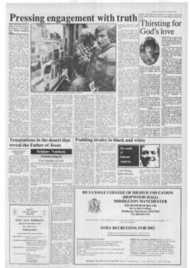Page 7, 18th February 1983
Page 7

Report an error
Noticed an error on this page?If you've noticed an error in this article please click here to report it.
Tags
Share
Related articles
Inside
Mary Craig's Tv And Radio
Mary Craig's Tv And Radio
Tvand Radio
Tvand Radio
Mad eye of the little tele god
Daniel Counihan previews Gerald Priestland's new series and examines a cartoon drama on radio.
A PROGRAMME going out this evening at 9 pm on Channel 4 responds remarkably to three of my frequent complaints: that television's fears of "talking heads" are exaggerated; that it makes too frequent use of the interview; and that too many of its religious broadcasts are concerned with social problems rather than religion.
This is the first of a series, Priestland Right and Wrong, in
which Gerald Priestland — having taken early retirement from the BBC has gone over to the other side to talk on the general theme of moral standards.
I have had a preview of the first two in the series. Tonight's, called And Make Me a Good Girl — Amen, might be described as setting the ground rules for what is to come.
While Priestland does not make the error of regarding religion and morals as synonymous — indeed, I would never have expected him to do so — he makes it perfectly clear, without eager autobiography or personal confessions, that he is a religious man on intellectual grounds as well as others.
With pleasing clarity and some humour, and no
pomposity or cant, he seeks to tell us — very well, to remind us
— of what distinguishes humanity from the beasts. He suggests what morals really are — which inevitably puts what he has to say into an essentially religious context pretty early on — and how we come to subject ourselves to such strictures, and what may be their purpose.
What he had to say was not a sermon. I suppose it might be described as a bit of not too strenuous philosophical jogging. There was a lot of fresh air in it, and I feel sure that anyone for whom a little light thinking is not an intolerable chore will find it tones up the system a fair treat. It is also entertaining.
As to the production techniques, I was delighted that not a single interview was intruded, and at no time was Priestland required for the sake of variety to seek off-the-cuff answers from someone else to elucidate matters that he was quite capable of explaining himself with greater economy.
He told me that this admirable reversion to sanity was the result of his own insistence. On the other hand, some fear of the "talking head" was evident. The fierce god of television — which should surely be symbolised by a demented eye enclosed in an oblong — was placated by making poor old Priestland appear first in a punt on the Isis, and then talk as he tramped round his college at Oxford, conveying the notion — by which I am impressed, but not entirely convinced — that it was here that he first learned the rules of thought.
He did this very well. Could he — I forgot to ask him — have been taking breathing exercises? But New College is quite an attractive place, and was consequently a distraction. This may cause some people to be lookers and not listeners, which would be a pity.
The god was more easily soothed for the second programme in the series. Priestland is discussing in this the moral issues of war and peace, and the British Army cooperated with an enormous variety of splendid bangs and pop-pops, lots of smoke and flame.
I give Priestland full marks for making himself heard, and interesting enough to secure attention, in spite of this martial glamour. I give the Army full marks also, because they were expressing with actions that unquestionably spoke louder than words Voltaire's muchquoted assertion, "I disapprove of what you say, but I will defend to the death your right to say it."
Priestland's message was one of total pacifism. Not everyone will agree with it, and I do not share its conclusions. But they seemed to have been arrived at almost with reluctance, and Priestland made it quite clear that he likes, respects and even admires the British soldier.
There was no misleading nonsense suggesting that unilateral disarmament would make it less likely that we may all be fried.
Priestland's pacifism, indeed, seemed to have little or nothing to do with mere avoidance of the consequences of war. I found it respectable and even moving.
There wasn't much of it in two programmes arising from the best-seller, When the Wind Blows, by the Brighton art teacher, Raymond Briggs, which has been called "a comic-strip satire on 'survivable' nuclear war", and is now a bestseller in six languages.
The elderly couple in When the Wind Blows, who attempt to follow conscientiously, solemnly and loyally official instructions on what to do when the bomb goes off, were transferred quite successfully into a sadly entertaining play on Radio 4, which certainly exposed the ineffectiveness of current Ci■ii Defence plans.
It didn't do more than that for me, though apparently it did for Mr Briggs, who explained in an Omnibus (BBC!) interview that it has caused him to become involved in all sorts of work to do with peace.
Am I wrong in feeling that the Beeb may be going a little over the top in plugging CND? The indications are that it is far from representing the majority, whose view should surely be given a fairer showing,. However this may be, I look forward eagerly to first publication of the Soviet edition of When the Wind Blows.
blog comments powered by Disqus











